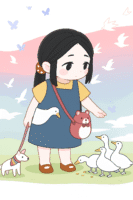Poverty Alleviation C08
by MarineTLChapter 8
“Ouyang Xia smiled encouragingly at Weisheng. ‘Xiao Wei, share your thoughts!'”
“Yeah, Wei sheng, since we’re still on the way, let’s all brainstorm and see if there’s a way we can help Wutong Town,” Zhang Zexuan chimed in.
This guy truly lived up to his reputation —with one sentence, he had pulled everyone into the discussion.
“Xiao Wei, just speak your mind freely! You guys come up with ideas, and I’ll handle writing the script!” Planning department’s Chen Mengjie perked up.
“Uh… have you ever considered that the more impoverished and underdeveloped a place is, the more likely it is to still have things that have long been phased out elsewhere?”
“I have a small, not fully formed idea—how about making this episode’s theme ‘Imprints of an Era’?”
“Brilliant! Xiao Wei, tell us more!”
Director Wang Qun suddenly squeezed over, eyes gleaming as he looked at Wei sheng.
Feeling a little overwhelmed under his intense gaze, Wei sheng had no choice but to steel himself and continue speaking.
“My grandma’s community senior dance troupe once wanted to choreograph a dance from the 70s. Many of the period-specific props were impossible to find in the city, and the replicas available online weren’t quite right. So, my grandma had me drive her to a far-off rural town. I was shocked to find they still had a supply and marketing cooperative there, and its warehouse was full of things I had never even seen before…”
“That’s right! Our town still has a supply and marketing cooperative, and they even sell kerosene lamps!” Ouyang Xia grew excited.
Following Weisheng’s idea, they might actually be able to turn this episode into a full-scale nostalgia special.
More importantly, as someone who had worked in television for over a decade, Ouyang Xia was well aware that most people born in the 80s and 90s no longer watched TV.
The remaining loyal TV viewers were mostly from the 70s and earlier.
If they did a “Imprints of an Era” nostalgia special, they might actually bring back these older audiences who still enjoyed traditional media.
Come to think of it, had their entire approach to traditional media been wrong all along?
Newspapers and television had always catered to people born between the 50s and 70s.
But look at what mainstream media focused on now—trending topics from social media, gossip about internet celebrities, influencer drama… None of this appealed to older viewers.
They had completely abandoned their original target audience while desperately trying to win over younger generations who had long since stopped paying for newspapers and television.
Everyone in the car was from the provincial TV station—no outsiders.
The producer, director, and the executive following along were all seasoned veterans with over a decade in the industry.
Hearing Weisheng’s words, the shock and realization they felt couldn’t be summed up in a few words.
The accompanying deputy director, face flushed with excitement, snatched the interview notebook and cartoon frog pen from planning department’s Chen Mengjie and immediately began writing furiously.
He had been hit with a wave of inspiration!
The deputy director felt like he could immediately write a research paper on “How to Enhance the Competitiveness and Market Share of Traditional Media.”
Chen Mengjie, robbed by leadership, dared not protest, but she pitifully opened her phone’s memo app and looked at Wei sheng with teary, doe-like eyes enhanced by colored contacts.
“Xiao Wei, our script for this episode is all on you now!!!”
Just like that, the heavy responsibility for the new episode fell on Wei sheng, a mere intern.
Fortunately, Zhang Zexuan, the social genius, quickly stepped in, rallying the whole team to brainstorm together. Ouyang Xia, being a native of Wutong Town, swiftly provided Chen Mengjie with locations in town where they could find items reflecting the “Imprints of an Era.”
The producer and director, both born in the 70s, also chimed in with ideas. In no time, they scrapped the original script and drafted a new three-day, two-night itinerary for the episode.
As for the original plan to have the guests work in exchange for survival funds?
Ha! That outdated countryside slow-life variety show format could go straight in the trash!
Everyone unanimously agreed to switch things up. Instead of simply working for survival funds, each guest would now trade their labor for old household items or earn money to purchase them from the town’s supply and marketing cooperative.
At the end, they would sell these nostalgic items through a livestream. The money they made would be donated to help improve conditions in Wutong Town.
When it came to making money, little money-lover Wei sheng was instantly wide awake.
Smiling shyly, he generously offered up his own customer resources to contribute to Wutong Town’s people.
“Actually, after accompanying my grandma on that trip, I ended up buying out the remaining stock from that town’s supply and marketing cooperative. You know how a lot of community seniors love performing era-specific dances and plays? I’ve been supplying them with props and costumes ever since…”
Everyone was floored.
Damn, Xiao Wei!
They sent you to help your grandma buy supplies, and you turned it into a side hustle?
Then again, everyone in the TV station was quick-witted. Seeing Weisheng’s initiative, they immediately started brainstorming ways to leverage this customer base.
Maybe they really could help the locals sell off their old, seemingly worthless items at a good price.
More importantly, this would make the show even more compelling. Otherwise, why do those antique appraisal programs always have such high ratings? Elderly viewers love this kind of content!
Imagine this: the guests uncover some dusty old items from the homes of locals in Wutong Town. Then, the production team brings in two skilled craftsmen to restore these antiques. Maybe some viewers watching the show would actually want to collect these pieces!
Though Wutong Town has no parasol trees, it does have vast stretches of poplar trees—some even planted directly in the fields.
According to local officials, this was out of necessity. The area was so impoverished that most young people had left to work elsewhere. Farming simply wasn’t profitable—after deducting costs for seeds, pesticides, and fertilizers, a year’s worth of hard labor in the fields might yield a net profit of just ten thousand yuan per household.
Meanwhile, young people moving to the cities could earn that much in two or three months working in factories, even with no skills.
As a result, much of the farmland was abandoned. Then, one young man who had worked in a furniture factory suggested planting poplar trees. Since the land was lying fallow anyway, why not use it for trees? Though they took years to mature, poplar wood could be sold to furniture manufacturers. Once grown, there would be buyers willing to collect the timber right from the fields.
That’s how rural business works—no matter how much local officials try to promote an idea, some people will always be skeptical, even suspecting a scam.
But if a neighbor quietly plants poplar trees first? Just wait—by the next New Year, their doorstep will be trampled by visitors!
The poorer the region, the stronger people’s desire to make money.
Especially when they suspect that their neighbor has found a secret path to wealth and hasn’t shared it. If someone is getting rich in silence, then whatever they’re doing must be profitable!
And so, once one household started planting poplars, within a few years, the entire Wutong Town was practically renamed “Poplar Town.”
As their vehicle turned onto a small road, the group suddenly spotted people by the roadside, carrying baskets and foraging for mushrooms.
“You guys have mushrooms here?” Zhang Zexuan leaned out of the car window, curious.
“Of course! When I was a kid, I often picked poplar mushrooms in the groves. They’re great for stews with meat or chicken,” Director Ouyang reminisced.
“Hey, Chen! Quickly add a mushroom-foraging segment to our new episode!” The director urged Chen Mengjie while simultaneously scolding Ouyang Xia.
“Ouyang, how could you forget such a fun segment? Do you know how many netizens nowadays spend hours watching videos of people foraging for mushrooms?”
Ouyang Xia was both amused and exasperated. “How was I supposed to know there were so many poplar trees here now? Back in the day, our town only had a small grove behind the school, and it was government-owned!”
That made sense. In the past, when food was scarce, every inch of farmland was used for crops—who would willingly leave good farmland idle, let alone plant trees on it? Anyone who dared would have been scolded to death!
The production team’s van finally arrived at the village. Since everyone on the team was from the provincial TV station, they hadn’t invited any difficult-to-manage celebrity guests. To save money, the director simply rented a few village houses. After dropping off their luggage, they started filming immediately.
The station’s instructions were simple: with only two sponsors left, the program had barely any budget. Every penny needed to be saved—there would be no promotional photos, no paid articles, no hired internet hype teams.
As long as they could finish shooting the last ten episodes without the show being canceled, that was enough.
Making money? No one cared anymore.
Not losing money would already be a miracle…
Given this “doomed-to-fail” approach, the director didn’t even bother crafting personas for them. He handed them a rough script and told them to just complete the tasks as written.
As a result, under Ouyang Xia’s guidance, Wei Sheng and the others spent the next three days treating this like an all-expenses-paid vacation, completely letting loose.
Especially Wei Sheng—he had initially feared freezing up in front of the camera, but once he got into it, he ended up being even more popular than the local, Ouyang Xia.
By the time they arrived in town, it was already afternoon. During room assignments, Wei Sheng, as the rookie, politely let the senior members choose first, taking whatever was left.
To his surprise, with everyone worried about their on-camera image, no one wanted to appear greedy by choosing the best room. One by one, they picked their spaces, and in the end, the best room was left for Wei Sheng!
He blinked at the camera but said nothing.
Later, when filming ended, he discovered that the house he was assigned was newly built, with a proper shower and toilet—unlike the others, which only had outdoor facilities. Without hesitation, he invited the other three guests to “his house” for showers.
“I gave the homeowner 500 yuan for water and electricity, so let’s all come here to shower and use the bathroom,” he offered generously.
“Oh my god, Wei, you’re amazing!” Chen Mengjie almost teared up with gratitude.
She simply couldn’t handle the idea of heating a pot of water and bathing in a plastic tub like the elderly villagers.
Just one basin of water meant she had to wash her hair first, rinse it carefully, apply soap, rinse again, wash her face, and do skincare…
She was convinced that even if she used up the entire household’s water supply, she might still not feel fully clean.
But with a shower? That was a game-changer.
She could fully embrace her lazy side—skip the conditioner, wash her hair and face simultaneously, and be in and out in three minutes!
The others, upon hearing that the issues of bathing and using the toilet had been resolved, secretly breathed a sigh of relief.
Under the torment of rural pit latrines, the four strangers quickly became the closest of comrades!
(End of this chapter)










0 Comments